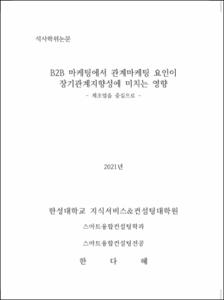B2B 마케팅에서 관계마케팅 요인이 장기관계지향성에 미치는 영향
= Influence of long-term relationship orientation on relationship marketing factors in B2B marketing : Focused on manufacturing industry
- Type
- Thesis
- Alternative Title
- - 제조업을 중심으로 -
- Advisor
- 전우소
- Department
- 지식서비스&컨설팅대학원 스마트융합컨설팅학과
- Issued Date
- 2021
- Publisher
- 한성대학교 지식서비스&컨설팅대학원
- Appears in Collections:
- 스마트융합컨설팅학과 > 1. Thesis
- Files in This Item:
-
-
Download
 200000361068.pdf
기타 데이터 / 1.69 MB / Adobe PDF
200000361068.pdf
기타 데이터 / 1.69 MB / Adobe PDF
-
Items in Repository are protected by copyright, with all rights reserved, unless otherwise indicated.